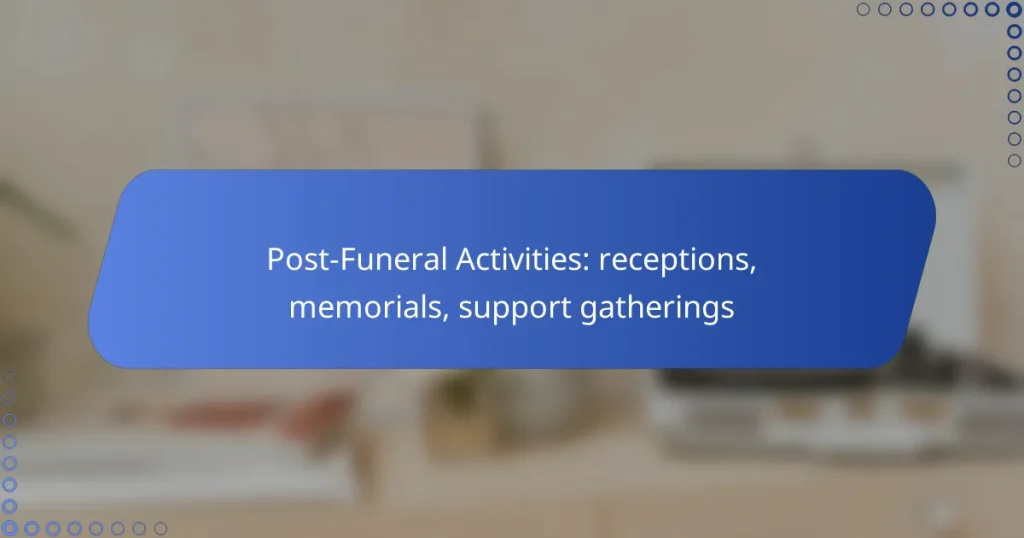Post-funeral activities play a crucial role in honoring the deceased and providing comfort to grieving family and friends. Options such as receptions, memorial services, and support gatherings allow attendees to connect, share memories, and find solace in their shared experiences. Each gathering can be tailored to reflect the wishes of the deceased and the needs of those left behind, fostering a sense of community during a difficult time.

What are the best post-funeral reception options in Canada?
In Canada, the best post-funeral reception options include casual family gatherings, formal receptions at venues, outdoor picnics in parks, community center events, and gatherings at religious institutions. Each option offers a unique way to honor the deceased while providing support and comfort to family and friends.
Casual family gatherings
Casual family gatherings are intimate and personal, allowing close relatives and friends to share memories in a relaxed setting. These can take place at a family member’s home or a familiar location, providing a comfortable atmosphere for everyone involved.
Consider preparing simple refreshments, such as finger foods and beverages, to facilitate conversation. This option is often less expensive than formal receptions and can be organized quickly, making it a practical choice for many families.
Formal receptions at venues
Formal receptions at venues offer a structured environment for larger groups to come together in remembrance. These can be held in banquet halls, hotels, or community centers, providing ample space for guests to mingle and share stories.
When planning a formal reception, consider catering options to provide meals or snacks, as well as audio-visual equipment for presentations or tributes. Budgeting for venue rental and catering is essential, as costs can vary widely depending on location and services offered.
Outdoor picnics in parks
Outdoor picnics in parks provide a serene backdrop for celebrating life and connecting with nature. This option is ideal for warmer months and can accommodate both small and large groups, allowing for a relaxed atmosphere.
When organizing a picnic, consider bringing blankets, portable chairs, and picnic baskets filled with easy-to-eat foods. Ensure to check park regulations regarding gatherings and permits, as some locations may require prior approval for larger groups.
Community center events
Community center events can serve as a great way to involve the local community in honoring the deceased. These venues often have facilities for hosting gatherings and can accommodate various activities, from speeches to shared meals.
Contact your local community center to inquire about availability, pricing, and any specific requirements for hosting an event. This option can foster a sense of community support and connection during a difficult time.
Religious institution gatherings
Gatherings at religious institutions provide a spiritual setting for remembrance and reflection. Many faith communities offer space for receptions following a funeral service, allowing attendees to come together in a familiar environment.
Check with the religious institution regarding their policies for hosting events, as some may provide catering or support services. This option often includes a sense of comfort and shared beliefs, making it meaningful for those involved.

How to plan a memorial service in Canada?
Planning a memorial service in Canada involves several key steps to honor the deceased while providing comfort to attendees. Consider the preferences of the deceased and their family, as well as logistical details such as location and guest invitations.
Choosing a location
Selecting a location for the memorial service is crucial. Common venues include community centers, places of worship, or even private homes, depending on the expected number of guests and the atmosphere desired. Consider accessibility, parking availability, and any necessary permits.
For larger gatherings, renting a hall may be beneficial, while smaller, intimate services can take place in a backyard or a favorite park. Ensure the location reflects the personality and wishes of the deceased.
Inviting guests
Inviting guests should be done thoughtfully, keeping in mind the deceased’s social circle. Create a list of family, friends, and colleagues who should be informed, and consider using digital invitations for convenience. Social media can also be a helpful tool to reach a wider audience.
Be clear about the date, time, and location in the invitations, and include any specific requests, such as dress code or contributions to a charity in lieu of flowers.
Coordinating with a funeral director
Working with a funeral director can simplify the planning process. They can assist with logistics, provide guidance on local regulations, and help coordinate details such as transportation and catering. Establish a clear line of communication to ensure all aspects of the service align with your vision.
Funeral directors often have established relationships with venues and vendors, which can lead to cost savings and smoother arrangements. Discuss your budget upfront to avoid unexpected expenses.
Incorporating personal touches
Adding personal touches to the memorial service can make it more meaningful. Consider including favorite songs, photographs, or videos that celebrate the life of the deceased. Personal anecdotes shared by family and friends can also create a warm atmosphere.
Creating a memory table with items that represent the deceased’s passions or hobbies can invite guests to reflect and share their own memories. Encourage attendees to participate in a memory book where they can write down their thoughts and stories.

What support gatherings can be organized after a funeral?
Support gatherings after a funeral provide a space for family and friends to connect, share memories, and process grief together. These gatherings can take various forms, such as support groups, memorial events, or online forums, each serving to foster community and healing.
Support groups for grieving families
Support groups for grieving families offer a structured environment where individuals can share their experiences and feelings. These groups typically meet regularly, either in person or virtually, and are often facilitated by a trained professional or a peer who has experienced similar loss.
When considering a support group, look for local organizations or community centers that specialize in grief support. Many groups are free or may have a nominal fee, making them accessible to a wide range of participants.
Memorial walks or runs
Memorial walks or runs serve as both a tribute to the deceased and a means to raise awareness or funds for causes related to their passing. These events can be organized by family members or local charities and often encourage participants to share their stories while engaging in physical activity.
To set up a memorial walk or run, choose a suitable location and date, and promote the event through social media and community boards. Consider partnering with local businesses for sponsorships or donations to cover costs and enhance participation.
Online support forums
Online support forums provide a convenient platform for individuals to connect with others who are grieving, regardless of geographical location. These forums allow users to share their thoughts, seek advice, and find comfort in knowing they are not alone in their experiences.
When participating in online forums, choose reputable platforms that focus on grief support. Engage actively but also set boundaries to ensure that your emotional health is prioritized. Many forums are free to join, making them an accessible option for those seeking support.

What are the costs associated with post-funeral activities?
Post-funeral activities can incur various costs, including venue rental, catering, decorations, and transportation. Understanding these expenses helps families budget effectively and make informed decisions about memorial gatherings.
Venue rental fees
Venue rental fees can vary significantly based on location, size, and amenities. Typical costs may range from a few hundred to several thousand dollars, depending on whether you choose a community hall, a restaurant, or a more formal event space.
When selecting a venue, consider factors such as capacity, accessibility, and available facilities. It’s advisable to book early to secure the desired location and potentially negotiate better rates.
Catering and food expenses
Catering costs for post-funeral receptions can vary widely, typically ranging from $15 to $50 per person, depending on the menu and service style. Options may include buffet-style meals, plated dinners, or simple refreshments.
When planning the menu, consider dietary restrictions and preferences of attendees. It’s often helpful to request quotes from multiple caterers to compare offerings and find the best fit for your budget.
Decorations and supplies
Decorations and supplies can enhance the atmosphere of a memorial gathering, with costs ranging from minimal to several hundred dollars. Simple floral arrangements and candles can be budget-friendly options, while elaborate setups may require a larger investment.
Consider DIY decorations to save costs, or consult with local florists and event planners for package deals that include both flowers and decor. Always keep the deceased’s personality and preferences in mind when choosing themes and colors.
Transportation costs
Transportation costs can arise from needing to move guests, especially if the venue is different from the funeral location. Depending on the distance and number of people, expenses may include rental vans, buses, or rideshare services.
To manage transportation costs effectively, consider carpooling options or coordinating with local services that may offer group rates. It’s also wise to communicate travel plans clearly to attendees to minimize confusion and ensure everyone arrives on time.

